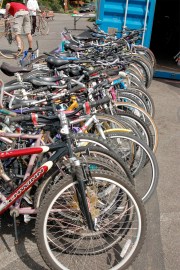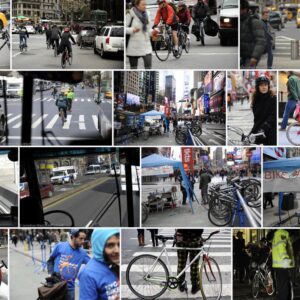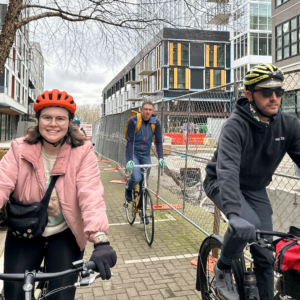
Africa-bound container.
(Photo: J. Leonard)
Thanks to a huge effort by Portlander Jenny Leonard and her friends and volunteers, 315 bikes and a bunch parts, tools, tubes and tires will soon be headed to rural South Africa where they’ll be used by kids who need a quicker and easier way to get to school.
Leonard hoped for 400 bikes and when she was well short of that number after the first publicized collection event, she decided to hold the container open for donations throughout last week.
In an email to supporters yesterday Leonard wrote, “I am so pleased with the fullness of the container and so impressed with everyone’s effort in getting the word out.”
The bikes are scheduled to arrive in Cape Town in early July and Leonard plans to be there well ahead of that date to follow the project “wherever it leads me and take whatever fun detours I can along the way.”
Leonard is working with the Portland chapter of Bicycles for Humanity. You can follow her upcoming adventures and inspiring work on her blog, Pack Light Travel with Bread.







Thanks for reading.
BikePortland has served this community with independent community journalism since 2005. We rely on subscriptions from readers like you to survive. Your financial support is vital in keeping this valuable resource alive and well.
Please subscribe today to strengthen and expand our work.
obtaining 315 bikes is quite the accomplishment. Good job!
Marcus, Agreed. Nice Work Jenny!
I think it’s great, but I am sure the Community Cycling Center could also have donated those bikes here locally…just a thought.
@ Chris, I’m sure the CCC could have done local good as well. I’m also not under the impression that the CCC is lacking for in-kind donations. No reason these programs can not coexist. Bicycles are not a zero sum game.
This is a very cool idea. I’m usually really skeptical of the efficacy of in-kind donations to Africa (t-shirts, used shoes, etc), but this seems well conceived and provides a good that might not be readily produced locally. The value of the goods vs. the cost of transit also likely makes sense.
Great work Jenny! I’m sure some kids are going to be very happy with their bikes. Facilitating education though improved transit is the kind of holistic development thinking that is needed.
When you donate a bike to the CCC they strip it down and sell the scrap metal. This is what a bike donation program should be.
Cheers to Jenny for organizing such a successful major bike donation project!
@Oh Word? #5 – That’s not really the way it works. My understanding is that the CCC accepts bike donations, and from those donations, separates bikes into two categories: those fit for transportation and those that are unrepairable/not fit for transport. The bikes that fall into the latter category are then stripped by volunteers. Usable parts are reused, non serviceable parts and frames are recycled.
Thanks so much for your work!
@ Steve B., that is correct.
I also feel that it’s great to give old bikes a new life, whether locally or globally. This was a great opportunity for folks who wished to help kids in Africa; if you want to help kids in Portland, you can do that any time. 🙂
Yes, I also think it was an inspiring project. I hesitated mentioning local needs, but I just feel sometimes we are too caught up with saving the world that we are blind to local opportunities.
This is so awesome. Congratulations on a job well done. I love hearing about good stuff like this happening and how bikes can make a difference.
Hope to see your blog nominated for Crank http://cranklisted.com
Darryl
Hopefully they are put to good use.
Unfortunately, many US “donation bikes” are older and low-quality models.
Ever see the way that bikes, when used, are used in rural africa? We’re talking unpaved or, worse, ONCE-paved roads, hundred pound cargo loads, passengers, you name it.
Combine this with limited access to modern bike tools, and you have different needs than lower-income domestic riders.
I’d like to see rural folks on bikes — certainly it is a LOT faster than walking, and when it works can dramatically cut down on time spent collecting water and fuel, cooking supplies.
But, if the bikes cannot hold up to the kind of use demanded, all we’re doing is creating more carbon emissions shuttling things around the globe, leaving behind a pile of junk that nobody can make use of.
See also, some of the “best intentions” of western aid for World-Bank-funded diesel tractors and the like.
It’s a complex world.
I hope that Leonard’s efforts go to promote good, but think that this sort of effort needs to focus on the most useable product.
(this means, for instance, department-store front-suspension “mountain” bikes are out.)
Best wishes!